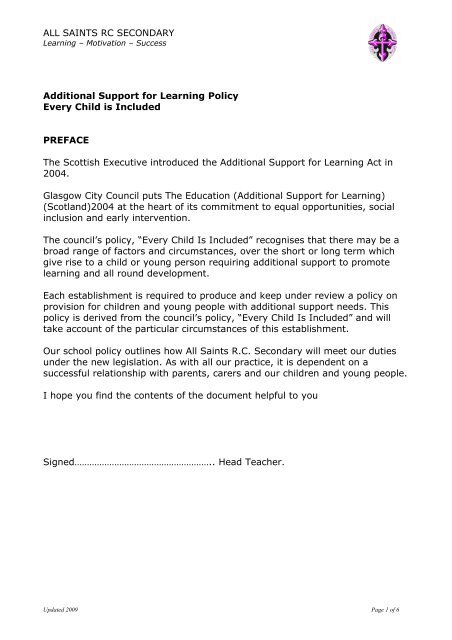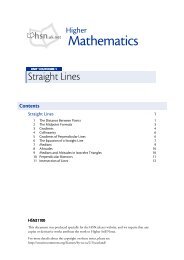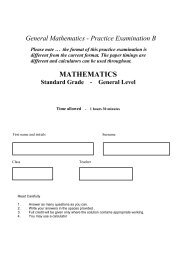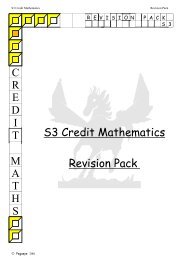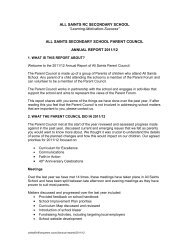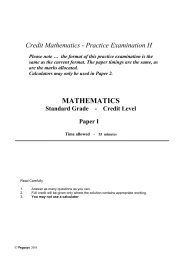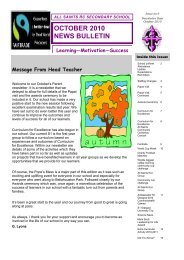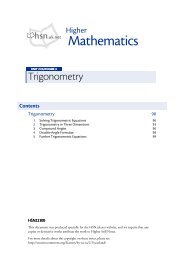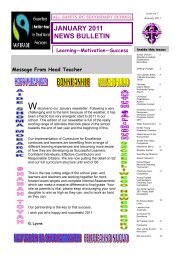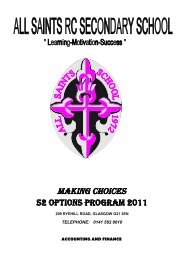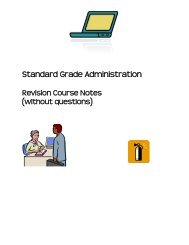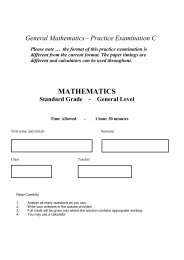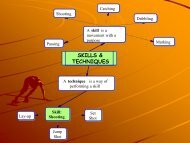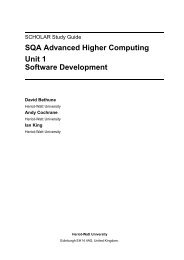Additional Support Needs - All Saints Secondary School
Additional Support Needs - All Saints Secondary School
Additional Support Needs - All Saints Secondary School
Create successful ePaper yourself
Turn your PDF publications into a flip-book with our unique Google optimized e-Paper software.
ALL SAINTS RC SECONDARY<br />
Learning – Motivation – Success<br />
<strong>Additional</strong> <strong>Support</strong> for Learning Policy<br />
Every Child is Included<br />
PREFACE<br />
The Scottish Executive introduced the <strong>Additional</strong> <strong>Support</strong> for Learning Act in<br />
2004.<br />
Glasgow City Council puts The Education (<strong>Additional</strong> <strong>Support</strong> for Learning)<br />
(Scotland)2004 at the heart of its commitment to equal opportunities, social<br />
inclusion and early intervention.<br />
The council’s policy, “Every Child Is Included” recognises that there may be a<br />
broad range of factors and circumstances, over the short or long term which<br />
give rise to a child or young person requiring additional support to promote<br />
learning and all round development.<br />
Each establishment is required to produce and keep under review a policy on<br />
provision for children and young people with additional support needs. This<br />
policy is derived from the council’s policy, “Every Child Is Included” and will<br />
take account of the particular circumstances of this establishment.<br />
Our school policy outlines how <strong>All</strong> <strong>Saints</strong> R.C. <strong>Secondary</strong> will meet our duties<br />
under the new legislation. As with all our practice, it is dependent on a<br />
successful relationship with parents, carers and our children and young people.<br />
I hope you find the contents of the document helpful to you<br />
Signed……………………………………………….. Head Teacher.<br />
Updated 2009 Page 1 of 6
ALL SAINTS RC SECONDARY<br />
Learning – Motivation – Success<br />
PROVISION FOR ADDITIONAL SUPPORT NEEDS<br />
General Classroom Practice<br />
<strong>All</strong> classroom teachers have a contractual and statutory duty to address the<br />
learning needs of all the children and young people in their class.<br />
For the majority of children and young people their additional support needs<br />
will be met by effective teaching and learning and appropriate differentiation.<br />
Identifying and Meeting <strong>Needs</strong><br />
The class teachers are the first line assessors of a child or young person’s<br />
additional support needs and will differentiate the curriculum or teaching<br />
strategies accordingly.<br />
Examples of this include:<br />
In the maths department, one teacher provides pupils who have difficulty with<br />
their tables, a tables square to assist with multiplication and division.<br />
In the science department, pupils with additional support needs are given a “<br />
Fill in the blanks “ exercise to save them having to write at length.<br />
In the English department, one pupil who is visually impaired, has her work<br />
enlarged to enable her to see the text better.<br />
In <strong>All</strong> <strong>Saints</strong> R.C. <strong>Secondary</strong>, the additional support needs coordinator B.<br />
O’Shea has responsibility for the following staff<br />
Staff with additional responsibility for pupil support<br />
Number of staff<br />
ASL / EAL 1<br />
SUPPORT FOR LEARNING 1<br />
PUPIL SUPPORT 5<br />
We also operate a range of initiatives which allow the school to respond<br />
effectively to specific support needs.<br />
<strong>Support</strong> Base- offering programmes of work to address self esteem issues or<br />
positive choices.<br />
Mentoring Programme- offering support to pupils on an individual basis with<br />
a specific member of staff and working on targets.<br />
PSAs-providing support in classrooms or at exam times for pupils with<br />
particular difficulties<br />
Updated 2009 Page 2 of 6
ALL SAINTS RC SECONDARY<br />
Learning – Motivation – Success<br />
J.S.T- meeting of professionals to look at solution focussed outcomes for<br />
specific children<br />
In our school we also have 1 teacher who has a diploma in <strong>Support</strong> for<br />
Learning, including additional support needs, 1 teacher with a certificate in<br />
Guidance and 2 teachers with certificates in counselling skills.<br />
Management of <strong>Additional</strong> <strong>Support</strong> <strong>Needs</strong><br />
Staff with additional responsibility for children and young people with<br />
additional support needs will ensure the sharing of relevant information related<br />
to a child / young person’s additional support needs, strategies or appropriate<br />
resources to all staff. <strong>All</strong> teachers will take account of this information to<br />
inform teaching and learning across the school (Stage 1 of the Intervention<br />
Model)<br />
If, however, the assessed additional support needs require prioritised input<br />
from school managed resources – for example learning or behaviour supportfor<br />
at least a school term, pupil support staff may need to identify short term<br />
outcomes, which should be shared with the class teacher, in order to establish<br />
progress. (Stage 2 of the Intervention Model)<br />
<strong>Additional</strong> local authority intervention, outwith the direct management of the<br />
school, would require an additional support plan (ASP) to be drawn up (Stage<br />
3 of the Intervention Model) This could include direct input from external<br />
specialist services e.g. Sensory <strong>Support</strong> Service or Psychological Services.<br />
If a child’s additional support needs also require input from social work<br />
services and or health an ASP would be drafted (Stage 4 of the Intervention<br />
Model).Some children and young people may meet the criteria for a Coordinated<br />
<strong>Support</strong> Plan. The decision<br />
as to whether a Co-ordinated <strong>Support</strong> Plan (CSP) is required will be taken by<br />
the Area Manager based on the information provided by the school and other<br />
agencies. Children and young people who have a CSP will also have an ASP.<br />
The ASP will identify the child’s significant additional support needs and the<br />
interventions which will address them.<br />
The plans are overseen by a member of the senior management team and will<br />
be brawn up in full consultation with parents / carers and the child. The<br />
contribution of children / young people and parents / carers to achieving the<br />
learning outcomes and the views of parents/ carers and children / young<br />
people will be sought.<br />
The school has the responsibility to monitor the implementation of the plans.<br />
Progress against the short term learning outcomes within an additional support<br />
plan or CSP will be reviewed as agreed at the initial planning meeting. An<br />
Updated 2009 Page 3 of 6
ALL SAINTS RC SECONDARY<br />
Learning – Motivation – Success<br />
annual review of plans will be held, attended by the relevant school staff and<br />
specialist services, parents and carers of the child or their advocate if<br />
appropriate.<br />
In accordance with authority policy, all ASPs will be signed by the HT and will<br />
be kept under regular review.<br />
We have clear plans to support the transition of a child or young person with<br />
additional support needs into or out of our establishment in line with<br />
timescales set within council policy. A nominated member of staff will act as<br />
the principal point of contact and coordinator of the transition of a named child<br />
or young person and will collaborate with other relevant professionals to<br />
ensure a successful transition process. The co-ordinators will ensure that<br />
parents/ carers and the child or young person are fully involved and informed<br />
at all stages of the process.<br />
<strong>All</strong> <strong>Saints</strong> R.C. <strong>Secondary</strong> is committed to meeting the additional support<br />
needs of all its children and young people. The Head Teacher or additional<br />
support needs co-ordinator will endeavour to provide information related to a<br />
child’s learning and teaching and will hopefully be able to answer any questions<br />
or reassure parents about any concerns or issues they may have.<br />
If we still cannot resolve the concerns of parents they will be advised to<br />
contact the appropriate person, depending on the nature of the ongoing<br />
concern.<br />
Mediation and Dispute Resolution<br />
<strong>All</strong> <strong>Saints</strong> R.C. <strong>Secondary</strong> will co-operate fully with the Mediation and Dispute<br />
Resolution process. However we would always strive to minimise parental<br />
concerns by ensuring that our approach to addressing additional support needs<br />
is clearly stated and understood by all and underpinned by a robust<br />
assessment and intervention process which reflects the partnership between<br />
home and school.<br />
Whole <strong>School</strong> Approaches to <strong>Support</strong> Learning<br />
Roles and responsibilities within the staged intervention model<br />
Stage 1<br />
<strong>All</strong> classroom teachers have a duty to ensure that they are providing an<br />
appropriate curriculum for the young people they teach. This will be done with<br />
the support of a faculty head who will have determined the outcomes and<br />
experiences of the curriculum and ensure that they are age and stage<br />
appropriate. An effective teacher will be fully aware of the needs of the pupils<br />
in his class and will use differentiation to meet those needs.<br />
Updated 2009 Page 4 of 6
ALL SAINTS RC SECONDARY<br />
Learning – Motivation – Success<br />
Pupil support staff will provide advice and guidance with reference to children<br />
who have specific difficulties. This information will be available to staff at the<br />
start of the session and will also be subject to discussion at one of three<br />
targeted meetings throughout the year.<br />
Stage 2<br />
If the support provided at stage 1 is not sufficient to meet the needs of<br />
children with additional support needs, other strategies may be adopted such<br />
as the use of a PSA to support learning in the classroom, the use of a mentor<br />
to check on specific targets or the provision of a support card to monitor<br />
behaviour or attendance etc.<br />
Pupil support staff will then engage with staff in identifying short term<br />
outcomes in order to establish progress.<br />
Stage 3<br />
If a child’s additional support need is such that he or she requires support from<br />
outwith the school, but within education services, an ASP would have to be<br />
drawn up.<br />
This could include intervention from psychological services or sensory support.<br />
Pupil support staff would be responsible for bringing the plan together and for<br />
involving parents and carers and young people.<br />
Classroom teachers might be invited to contribute to the short or long term<br />
plans.<br />
Stage 4<br />
Where there is a requirement for social work involvement and or health, and<br />
ASP at stage 4 would be required. For some children this might also be<br />
grounds for the consideration of a CSP. This would be decided by the Area<br />
Manager.<br />
Pupil support staff would be responsible for bringing the plan together and for<br />
involving parents and carers and young people.<br />
Classroom teachers might be invited to contribute to the short or long term<br />
plans.<br />
Inclusive Staged Intervention Approaches<br />
In order to better meet the needs of our pupils in <strong>All</strong> <strong>Saints</strong> R.C. <strong>Secondary</strong> we<br />
have established a timetabled programme of meetings between D.H.Ts and<br />
Pupil <strong>Support</strong> staff. This provides an opportunity to discuss the varying needs<br />
of all pupils and especially those who have additional support needs.<br />
Minutes are taken at these meetings and the action required is recorded.<br />
From there pupils may be referred to our Joint <strong>Support</strong> Team meeting which<br />
takes place every four weeks. This involves representatives from social work,<br />
psychological services, the ELO, the school nurse and relevant school<br />
personnel.<br />
Minutes are taken at these meetings and the required action is recorded.<br />
Review of all cases takes place twice yearly.<br />
Updated 2009 Page 5 of 6
ALL SAINTS RC SECONDARY<br />
Learning – Motivation – Success<br />
Procedures for Liaising with Other Agencies and Services<br />
Informally it is very possible to call either social work services, psychological<br />
services, or indeed any of our partners directly for advice and support.<br />
However the majority of meetings are planned and timetabled.<br />
This is agreed at the start of each new session<br />
Meetings between the school’s ELO and pupil support staff take place on a<br />
weekly basis to discuss those pupils whose attendance is causing concern.<br />
Procedures for Involving Parents and Carers and Young People and<br />
Children<br />
At very early stages of intervention direct contact is made with parents and<br />
carers either through telephone contact, by letter, or an invitation to a<br />
meeting.<br />
Where more formal involvement is required due to the need to have the<br />
parent’/carers’ and young people’s views this would be put in writing to all<br />
involved.<br />
Quality Assurance Procedures<br />
We have agreed that September will be the focus for all planning activity in the<br />
next session, with reviewing of plans taking place in May of the following year.<br />
Sampling of plans will take place in October<br />
B. O’Shea will be responsible for the implementation of all plans.<br />
Updated 2009 Page 6 of 6


